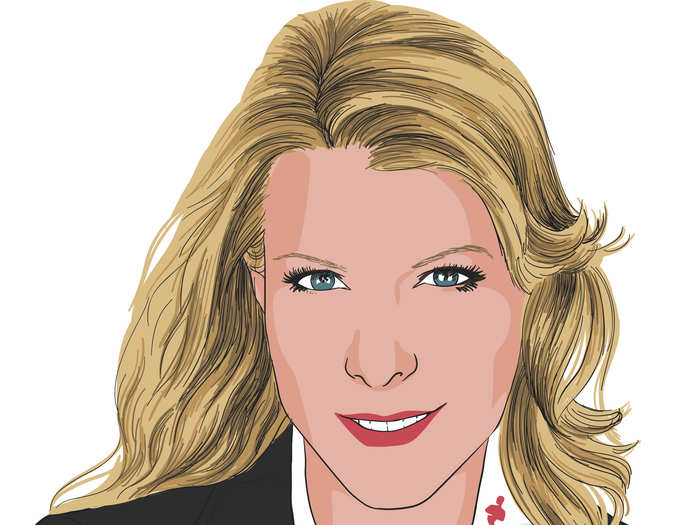- Home
- slideshows
- miscellaneous
- Gary Vaynerchuk and 9 other successful leaders on how to respond when employees royally mess up
Gary Vaynerchuk and 9 other successful leaders on how to respond when employees royally mess up
1. Fire high performers with bad attitudes

2. Empower your employees

Let employees grow, which is good not only for them but for the company as well. That can result in mistakes, but they teach people what not to do. Empowering employees' growth allows them to innovate. If they fear being fired for trying and failing, they will fall into a routine, which stunts creativity. Just remind them never to do anything illegal or unethical.
— Dottie Herman, CEO of Douglas Elliman, a real estate brokerage empire with more than $27 billion in annual sales. Connect with Dottie on Facebook, Instagram, and Twitter.
3. Embrace failure

When a mistake cost our company $2 million, I handled it the same way we treat every mistake: by using the "Five Whys Method" to continuously ask why until we identify the root cause behind what happened. Then we ensure it never happens again.
A manager's job is to align their people with roles that are best for their strengths and weaknesses. When someone repeatedly makes mistakes, they aren't in the right position. Instead of firing them, I reposition them until I find the right one — as long as they are an A-player with the right work ethic, attitude, and energy. Today, the employee who made the $2 million mistake is one of our top performers.
— Mike Peters, entrepreneur, philanthropist, XPRIZE Foundation board member, and founder of the Yomali group of companies, which has generated more than $1 billion in sales online. Read about Mike's rollercoaster journey.
4. Ask these questions

Discuss the circumstances with the employee before deciding on the right action. Was it our fault or the client's? Bad timing or miscommunication? Is it recoverable? What's the cost to the company? Are there legal ramifications? What can we learn, and how can we recover?
If the mistake was careless or becomes a continuous issue, that's one thing; but most mistakes are honest ones. Either way, berating won't solve the problem. If anything, it will escalate it. What's done is done. Some mistakes are more expensive than others, but they're all just teachable moments
— Gail Corder Fischer, cofounder and executive vice chairman of Fischer & Company, a leading global corporate real estate firm that provides consulting, brokerage, and technology solutions.
5. Consider their intention

The intent is what matters. If the mistake was deliberate or malicious, let the employee go immediately to get rid of bad energy before it spreads. But if the intent was good, I reflect on whether I could have made the same mistake. Consider their attitude and past performance as well.
Motivate your team to learn from mistakes, and let them own the solution. Then grow from the experience by tightening up procedures and training other staff on the incident. Your people are your biggest assets — especially those who have made mistakes, because they have learned the hard way. Forgiveness also inspires loyalty and commitment.
— David Hoffmann, cofounder and CEO of GlobalTQM, a division of the international trade company Global Regency. Connect with David on LinkedIn.
6. Take responsibility

I take responsibility if someone doesn't perform because that means I didn't train them well, set expectations, or keep them accountable. (Or maybe I hired the wrong person.) Until you're a huge company, the CEO is responsible for hiring and creating the culture, onboarding, and training.
Hold weekly team meetings and regular one-on-ones so everyone is on the same page. If mistakes happen, consider how you can help the employee in the future. For example, if it was a miscommunication, maybe they aren't up to speed on our communication policies. If they aren't hitting their goals, perhaps their responsibilities need to be clarified.
— Yuri Elkaim, founder and CEO of Healthpreneur, former professional athlete, and New York Times bestselling author. Read how Yuri went from making $80 a week to building million-dollar businesses, and connect with him on Facebook, LinkedIn, and YouTube.
7. Update your employee training

When an employee makes a mistake, ask yourself: Was this a result of my training (or lack of it)? We hire people because we are busy, and we often fail to allocate enough time for proper onboarding. Your team is only as strong as the training you give them, so maintain an open dialogue.
While some mistakes matter more than others, everyone deserves an opportunity to learn from them. Handle these teachable moments professionally and gracefully. Then if it becomes a recurring problem, reconsider the employee's long-term effectiveness.
— Ashley Alderson, founder and CEO of The Boutique Hub and Boutique.Style, cancer survivor, motivational speaker, and host of "Boutique Chat." Connect with Ashley on Instagram and LinkedIn.
8. Be compassionate

"We all make mistakes. What matters is how we resolve them and move forward." Those words didn't make me feel better. I had just messed up big time, and I felt terrible. I expected a harsh response from my boss, but to my surprise, he just calmly focused on how we could fix it. This made me feel even more guilty — and determined to resolve the problem.
We're all human. Learn to anticipate mistakes, encourage your team to be accountable and find a solution, and implement systems so it doesn't happen again. Being a compassionate leader — a human leader — creates more loyalty and respect than anger ever could."
— Johnathan Ruggiero, cofounder and CEO of wedding band company Manly Bands. Read Johnathan's story and connect with him on LinkedIn.
9. Support your team

In "How to Win Friends and Influence People," Dale Carnegie taught us that criticizing others is futile. It only alienates the person who made the mistake and makes them resent the associated bad feelings. Instead, have faith in others and reassure them that they will learn from the mistake and won't make it again. When you have their back, employees will feel grateful and loyal — and everyone wins.
That said, how an employee handles their mistakes defines their future in our office. If I don't trust them or believe they aren't learning from repeated mistakes, I find a replacement."
— Holly Parker, founder and CEO of The Holly Parker Team at Douglas Elliman, award-winning broker who has made over $8 billion in sales. Read Holly's story and connect with her on LinkedIn and Instagram.
10. Treat mistakes as a chance for collective learning

If employees are afraid to make mistakes, they're afraid to take risks. When you're in tech, that's not the kind of culture that's going to propel your company forward. As a leader, you need to make it clear that one-off mistakes won't be handled the same as repeated negligence.
We treat mistakes as opportunities to do better. Talk with those involved to understand what happened, then strategize ways to improve or avoid the outcome next time. Finally, share the incident with the rest of the team so you can learn from it collectively.
— Luke Freiler, CEO and cofounder of Centercode, a Customer Validation solutions provider that helps hundreds of enterprises and high-growth tech companies bring dynamic and delightful products to market. Connect with Luke on LinkedIn.
Want to share your insights in a future article? Join The Oracles, a mastermind group of the world's leading entrepreneurs who share their success strategies to help others grow their businesses and build better lives. Apply here. Follow The Oracles on Facebook, Twitter, and LinkedIn.
Popular Right Now
Popular Keywords
Advertisement